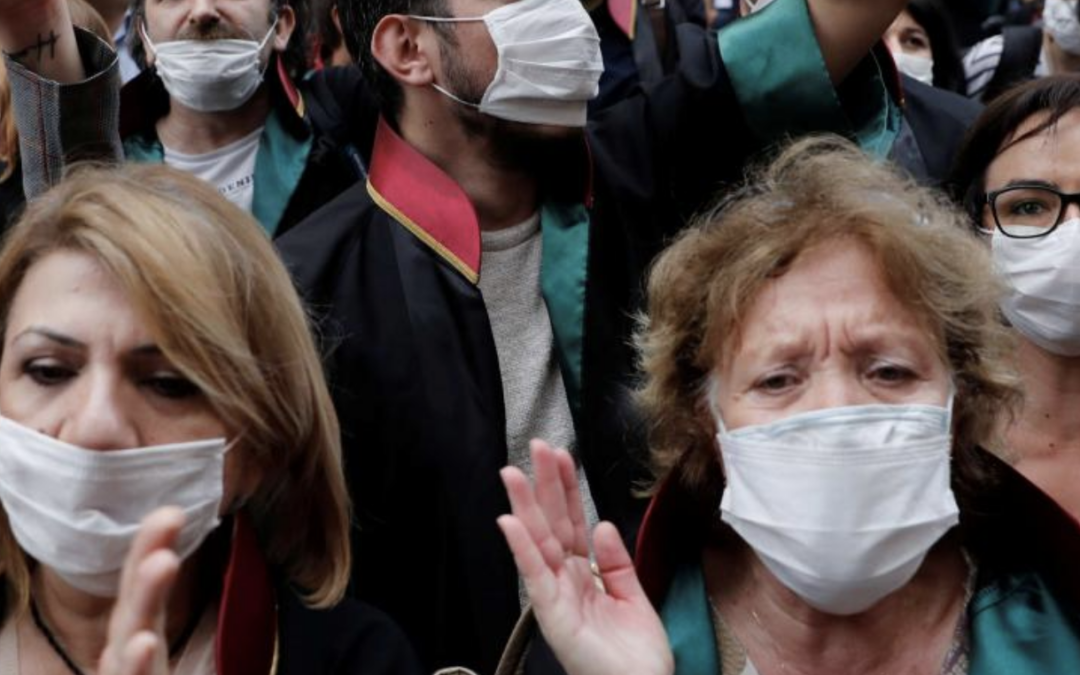
Sep 14, 2020 | News
The ICJ expressed today its deep concern at the arrest order of some 60 lawyers in Turkey on grounds allegedly linked to the representation of their clients, in breach of Turkey’s international law obligations.
The ICJ understands that around 47 lawyers have been arrested on 11 September in Turkey while 13 others are being searched by police for allegedly acting on behalf of clients accused of participation in the Gülenist movement, called by Turkish authorities the “Fetullahist Terrorist Organisation” (FETO). It has been reported that lawyers were interrogated about their professional activities.
“Lawyers should never be arrested or sanctioned for representing their clients, or identified with their clients causes,” said Roisin Pillay, Director of the ICJ Europe and Central Asia Programme,
“This is a basic principle of the independence of the legal profession and international law and its respect is essential to ensure that everyone has the right to a fair trial.”
The ICJ will follow the case closely to ensure that international law and standards are respected concerning any action against the lawyers arrested.
“If the sole charges against the lawyers arrested are related to their work as lawyers representing their clients, they should be immediately released,” added Roisin Pillay.
The ICJ stressed that they should not be subject to arrest for the legitimate exercise of any human rights and fundamental freedoms. In the event that any of them are subject to charges for cognizable crime consistent with Turkish and international law, they must be brought immediately before a court to consider whether any continued detention is lawful. If charged, they must be in ensured all rights of fair trial by independent and impartial courts.
The UN Basic Principles on the Role of Lawyers say that “lawyers shall not be identified with their clients or their clients’ causes as a result of discharging their functions” (article 18).
Contact:
Roisin Pillay, e: roisin.pillay(a)icj.org
Massimo Frigo, e: massimo.frigo(a)icj.org – t: +41797499949
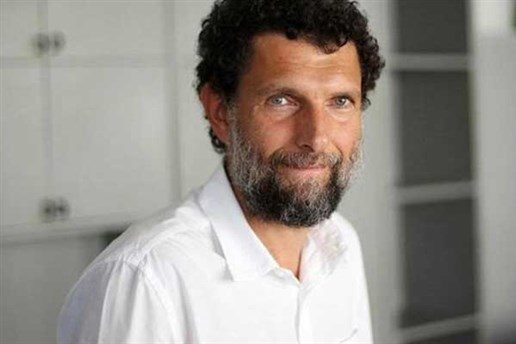
Sep 7, 2020 | News
Turkish authorities should immediately release human rights defender Osman Kavala, in compliance with the Council of Europe Committee of Ministers’ decision of 3 September 2020, the International Commission of Jurists (ICJ), Human Rights Watch and the Turkey Human Rights Litigation Support Project said today.
The decision followed a Committee of Ministers hearing to assess the execution of the judgment of the European Court of Human Rights in the case of Osman Kavala. The Committee, acting in its supervisory capacity for Court Judgments, ordered the Turkish authorities, “to ensure the applicant’s immediate release,” pointing to, “a strong presumption that his current detention is a continuation of the violations found by the Court.”
“After the finding by the European Court of Human Rights that Kavala’s detention is unlawful, the Committee of Ministers has affirmed that Turkey is continuing to violate his rights by keeping him in detention” said Roisin Pillay, director of the Europe and Central Asia Programme at the International Commission of Jurists. “European Court rulings are binding, and Osman Kavala should be released immediately.”
Despite the unlawful detention and an acquittal by the Turkish criminal court presiding over his trial, Osman Kavala has been kept behind bars under a newly issued charge of “espionage” since March 2020. His lawyers are currently challenging the lawfulness of the detention before Turkey’s Constitutional Court. However, the Committee of Ministers indicated in its decision that Turkey should not wait for a ruling of the Constitutional Court but should release Kavala immediately.
In June, the ICJ, Human Rights Watch and the Turkey Human Rights Litigation Support Project made a detailed submission to the Committee of Ministers of the Council of Europe, which oversees enforcement of European Court of Human Rights judgments. The submission argued that the sequence of events and repeated local court decisions to ensure Kavala’s detention subsequent to the European Court’s ruling in December 2019 demonstrated that Turkey was prolonging the violations found by the European Court.
The European Court judgment in Kavala v. Turkey (Application no. 28749/18) found violations of the following provisions of the European Convention on Human Rights: Article 5(1) (right to liberty and security), Article 5(4) (right to a speedy decision on the lawfulness of detention), and the rarely used Article 18 (limitation on use of restrictions on rights) taken together with Article 5(1). The Court required Turkey to release Kavala and said that any continuation of his detention would prolong the violations and breach the obligation to abide by the judgment in accordance with Article 46(1) of the Convention.
The judgment on Osman Kavala’s case is particularly significant because it is the first final ruling of the European Court of Human Rights against Turkey in which the Court determined that, in interfering with an individual’s rights, Turkey acted in bad faith and out of political motivations, violating Article 18 of the European Convention on Human Rights. The Court said that by detaining Kavala since November 2017 and prosecuting him, the Turkish authorities had “pursued an ulterior purpose, namely to silence him as human rights defender.”
Kavala has been held in detention since November 2017, initially on bogus allegations that he used the 2013 Istanbul Gezi Park protests as a pretext for an attempt to overthrow the government, and that he was involved in the July 15, 2016 attempted military coup. On February 18, 2020, Kavala and his eight co-defendants were acquitted on charges of “attempting to overthrow the government by force and violence” in the Gezi Park trial.
But Kavala was not released, and a court ordered his detention again immediately on one of the grounds for his initial detention on 1 November 2017, namely the charge of “attempting to overthrow the Constitution by force and violence” because of the ongoing July 15, 2016 coup attempt-related investigation against him. Turkey’s President Recep Tayyip Erdoğan had publicly criticized his acquittal just before he was detained again. Weeks later a court ordered his detention a second time on another charge (“espionage”) but under the same investigation file on the coup attempt and relying on the same evidence.
“The decision by the Council of Europe Committee of Ministers confirms our submission that political considerations are behind the court orders prolonging Osman Kavala’s detention , and that there has been a concerted official effort to prevent Kavala’s release,” said Emma Sinclair-Webb, Turkey director at Human Rights Watch.
“Instead of complying with the European Court’s judgment, Turkey has continued to violate Kavala’s human rights.”
The targeted harassment in Turkey of rights defenders is part of a wider practice of arbitrary detentions and abusive prosecutions of journalists, elected politicians, lawyers, and other perceived government critics. This practice has been well-documented in many reports by the Council of Europe, the European Union, and human rights organizations.
“The campaign of persecution against Osman Kavala and the failure to release him and drop all charges have perpetuated a chilling environment for all human rights defenders in Turkey,” said Ayşe Bingöl Demir, co-director of the Turkey Human Rights Litigation Support Project.
“Ending this blatantly unlawful detention, which has been ongoing for over 1000 days, will not only play a role in preventing further violations to Osman Kavala’s rights, it will also give a strong signal to the human rights defenders community that the oversight mechanisms in place to ensure Turkey’s compliance with its international human rights obligations can still be effective.”
Contact:
Róisín Pillay, Director of ICJ’s Europe and Central Asia Programme, t: +32-2-734-84-46 ; e: roisin.pillay(a)icj.orgMassimo Frigo, Senior Legal Adviser, ICJ’s Europe and Central Asia Programme, t: +41-79-749-99-49 ; e: massimo.frigo(a)icj.org ; Twitter: @maxfrigo
Türkiye: Osman Kavala Serbest Bırakılmalı
Yetkililer, Avrupa Konseyi’nin İnsan Hakları Savunucusunu Serbest Bırakma Kararına Uymalıdır
(Cenevre, 7 Eylül 2020) Uluslararası Hukukçular Komisyonu (ICJ), İnsan Hakları İzleme Örgütü ve Türkiye İnsan Hakları Davalarına Destek Projesi, yaptıkları açıklamada Türkiye makamlarının insan hakları savunucusu Osman Kavala’yı Avrupa Konseyi Bakanlar Komitesinin 3 Eylül 2020 tarihli kararına uygun olarak derhal serbest bırakması gerektiğini ifade etti.
Bu karar, Osman Kavala davasında Avrupa İnsan Hakları Mahkemesi’nin kararının uygulanmasını değerlendiren Bakanlar Komitesi oturumunu müteakiben alındı. Mahkeme kararlarının uygulanmasını denetleme yetkisi olan Komite, Türk makamlarına “başvuranın derhal serbest bırakılmasını sağlama” talimatı vererek “mevcut tutukluluğunun mahkeme tarafından tespit edilen ihlallerin devamı olduğuna dair güçlü bir karine bulunduğuna” işaret etti.
Uluslararası Hukukçular Komisyonu Avrupa ve Orta Asya Programı Direktörü Roisin Pillay,” Avrupa İnsan Hakları Mahkemesi’nin, Kavala’nın tutukluluğunun hukuka aykırı olduğunu tespit etmesinden sonra, Bakanlar Komitesi, Türkiye’nin Kavala’nın tutukluluğunu sürdürerek onun haklarını ihlal etmeye devam ettiğini doğruladı” dedi. Pillay, “Avrupa Mahkemesi kararları bağlayıcıdır ve Osman Kavala derhal serbest bırakılmalıdır” dedi.
Hukuka aykırı tutukluluğuna ve davasının görüldüğü Ceza Mahkemesinin verdiği beraat kararına rağmen, Osman Kavala yeni ileri sürülen bir “casusluk” suçlaması nedeniyle Mart 2020’den bu yana parmaklıklar ardında tutulmaya devam ediliyor. Kavala’nın avukatları, Türkiye’nin Anayasa Mahkemesi önünde tutukluluğun hukuksuz olduğuna ilişkin itirazlarda bulunuyorlar. Ancak Bakanlar Komitesi, kararında Türkiye’nin Anayasa Mahkemesinin vereceği bir kararı beklemeksizin Kavala’yı derhal serbest bırakması gerektiğini işaret ediyor.
Haziran ayında, ICJ, İnsan Hakları İzleme Örgütü ve Türkiye İnsan Hakları Davalarına Destek Projesi, Avrupa İnsan Hakları Mahkemesi kararlarının uygulanmasını denetleyen Avrupa Konseyi Bakanlar Komitesi’ne ayrıntılı bir bildirim sundu. Bildirim, Avrupa Mahkemesi’nin Aralık 2019’daki kararının ardından Kavala’nın alıkonmasını sağlamak için gelişen olaylar serisinin ve tekrarlanan yerel mahkeme kararlarının, Türkiye’nin Avrupa Mahkemesi tarafından tespit edilen ihlalleri devam ettirdiğini gösterdiğini savundu.
Avrupa Mahkemesi, Kavala/Türkiye kararında (Başvuru no. 28749/18), madde 5/1 (özgürlük ve güvenlik hakkı), madde 5/4 (alıkonmanın yasaya uygunluğuna ilişkin ivedi karar alma hakkı) ve nadiren kullanılan madde 18 (haklara getirilecek kısıtlamaların sınırlanması) ile birlikte madde 5/1’in ihlal edildiğine karar vermiştir. Mahkeme, Türkiye’nin Kavala’yı tahliye etmesini zorunlu kılmış, tutukluluğunun devam etmesinin ihlalleri devam ettireceğini ve Sözleşmenin 46(1) maddesi uyarınca AİHM kararlarına uyma yükümlülüğünü ihlal edeceğini belirtmiştir.
Osman Kavala kararı, Türkiye’nin kötü niyetle ve siyasi amaçlarla bir bireyin haklarına müdahale ettiğini ve Avrupa İnsan Hakları Sözleşmesi’nin 18. maddesini ihlal ettiğini tespit eden Türkiye aleyhindeki ilk nihai karar olduğundan özel bir önem taşımakta. AİHM, Osman Kavala’yı Kasım 2017’den bu yana alıkoyup yargılayan Türk makamlarının “başvuranın bir insan hakları savunucusu olarak susturulmasını sağlamak için örtülü bir amaç taşıdığını” tespit etmişti.
Kavala, Kasım 2017’den bu yana, 2013 İstanbul Gezi Parkı protestolarını, hükümeti devirme girişimi için kullandığı ve 15 Temmuz 2016 askeri darbe girişimine müdahil olduğu yönündeki asılsız iddialarla tutuklu. 18 Şubat 2020’de Kavala ve diğer sekiz sanık, Gezi Parkı davasında “cebir ve şiddet kullanarak hükümeti ortadan kaldırmaya teşebbüs” suçlamasından beraat etmiştir.
Ancak Kavala cezaevinden tahliye edilmemiş ve bir hakim kararıyla 2016 darbesiyle ilgili devam eden bir soruşturmayla ilişkili olarak “anayasal düzeni cebir ve şiddet kullanarak ortadan kaldırmaya teşebbüs” suçlamasıyla tekrar tutuklanmıştır. Tekrar tutuklanmasından kısa bir süre önce Cumhurbaşkanı Recep Tayyip Erdoğan halka açık şekilde Kavala’nın beraatini eleştirmiştir. Kavala haftalar sonra, yine bu delillere ve soruşturma dosyasına dayanan bir başka suçlama ile (casusluk) bir kez daha tutuklanmıştır.
İnsan Hakları İzleme Örgütü Türkiye Direktörü Emma Sinclair-Webb,” Avrupa Konseyi Bakanlar Komitesi’nin kararı bildirimimizi doğrulamakta, Osman Kavala’nın tutukluluk halini uzatan mahkeme kararlarının arkasında siyasi değerlendirmelerin olduğunu ve Kavala’nın serbest bırakılmasını önlemek için ortak bir resmi çabanın bulunduğunu ortaya koymaktadır” dedi.
Sinclair-Webb, “Avrupa Mahkemesi’nin kararına uymak yerine, Türkiye, Kavala’nın insan haklarını ihlal etmeye devam etmiştir” dedi.
Türkiye’de insan hakları savunucularına yönelik baskı, daha genel olarak gazetecilere, seçilmiş siyasetçilere, hukukçulara, hükümeti eleştirdiği düşünülenlere yönelik keyfi alıkoymalar ve yargısal tacizin bir parçasıdır. Bu uygulama Avrupa Konseyi, Avrupa Birliği ve insan hakları örgütlerine ait birçok raporla belgelendirilmiştir.
Türkiye İnsan Hakları Davalarına Destek Projesi Eş Direktörü Ayşe Bingöl Demir “Kavala’ya karşı yürütülen yıldırma kampanyası, onun tahliye edilmemesi ve hakkındaki suçlamaların düşürülmemesi, Türkiye’deki tüm insan hakları savunucuları için baskı ortamının sürmesine sebep olmuştur” dedi.
“1000 gün boyunca devam eden açıkça hukuka aykırı olan tutukluluğun sona ermesi, yalnız Osman Kavala’nın haklarının daha fazla ihlal edilmesini önlemek konusunda değil, aynı zamanda insan hakları savunucuları topluluğuna Türkiye’nin uluslararası insan hakları yükümlülüklerine uyumunu denetleyen mevcut gözetim mekanizmalarının hala etkili olabileceği yönünde güçlü bir sinyal verecektir.”
İnsan Hakları İzleme Örgütü’nün Türkiye ile ilgili diğer raporları için tıklayınız:
https://www.hrw.org/europe/central-asia/turkey
Daha fazla bilgi için :
İstanbul’da, Emma Sinclair-Webb (İngilizce, Türkçe): +90-538-972-4486 (Whatsapp); ya da sinclae@hrw.org. Twitter: @esinclairwebb
Cenevre’de, Massimo Frigo (İngilizce, Fransızca, İspanyolca ve İtalyanca): +41-79-749-99-49; ya da massimo.frigo@icj.org. Twitter: @maxfrigo
Brüksel’de, Róisín Pillay (İngilizce, Fransızca): +32-2-734-84-46 (cep telefonu); ya da roisin.pillay@icj.org
New York’ta, Aisling Reidy (İngilizce) +1-917-378-3178 (cep telefonu); ya da reidya@hrw.org
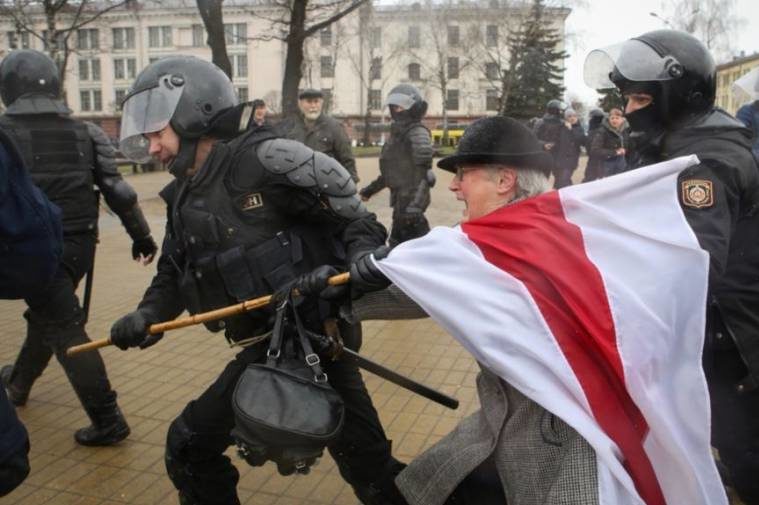
Aug 31, 2020 | Advocacy, News
Today, the ICJ called on Belarus to comply with its international human rights law obligations in its response to the protests taking place in the aftermath of the presidential elections and in the treatment of those detained.
This includes immediately releasing persons arbitrarily detained, providing prompt access to lawyers for those still detained, accounting for the fate and whereabouts of missing protestors and promptly and effectively investigating torture and other ill-treatment.
The widespread arbitrary arrests of peaceful protesters, and credible allegations of torture and ill-treatment and enforced disappearances of detainees, are particularly alarming in light of obstacles faced by detainees in accessing lawyers, the ICJ said.
The ICJ recalls that under international human rights law, all persons have the right to peaceful assembly, and any restriction of this right must be provided in law be strictly necessary and proportionate to a specified legitimate purpose. The mass arrest of protesters does not appear to meet these requirements.
Belarus has obligations, including under treaties to which it is party, to respect the right to liberty and refrain from arbitrary arrests or other unwarranted interferences with the freedom of assembly, or freedom of expression, of protesters, protected under international law.
Law enforcement authorities must respect the right to life and the prohibition on torture or other ill-treatment at all times. Allegations of arbitrary killing, enforced disappearances and torture and other ill-treatment must be promptly, thoroughly and independently investigated, and those responsible brought to justice.
Effective remedies must be provided to victims of such serious human rights violations.
The ICJ is concerned about reports of the widespread denial of access to a lawyer and further obstacles that lawyers face while carrying out their professional duties in the current context in Belarus.
Reportedly, lawyers are not provided with access to the case file or further information necessary for the provision of effective legal assistance to their clients. This is of particular concern in light of multiple reports of torture or other ill-treatment of those detained following the election.
The ICJ stresses that the right of access to qualified legal representation is crucial for the protection of the human rights of those arrested in connection with the current political upheaval in Belarus.
The right of access to a lawyer is recognized as an essential element of the right to a fair trial and the right to liberty, protected under the International Covenant on Civil and Political Rights, to which Belarus is a party.
The UN Basic Principles on the Role of Lawyers provide that governments should ensure that lawyers are able to perform all of their professional functions without intimidation, hindrance, harassment or improper interference and should be able to consult with their clients freely and have access to appropriate information, files and documents in their possession or control in sufficient time to provide effective legal assistance to their clients.
It is essential that lawyers and other human rights defenders can carry out protection of human rights of their clients especially in times of emergency.
The ICJ also calls on the Belarus Republic Bar Association to bolster its efforts in protecting its members who provide legal representation in cases related to the ongoing protests.
Background:
The Republic of Belarus ratified the International Covenant on Civil and Political Rights in 1973
Following the presidential elections of 9 August 2020 in Belarus, widespread protests across Belarus took place following the discredited result, which were recognized as neither free nor by the European Union and other observers. Following the initial dispersal of these protests by the authorities, more than 6000 people were arrested and detained, many arbitrarily. There is credible evidence that many of those arrested or detained have been subjected to torture or other ill-treatment and that decisions regarding their arrest and detention have been made by courts temporarily established in detention centres.
While estimates of numbers differ, the whereabouts of at least tens of those who took part in the protest have not been established to date. One of the missing persons, Nikita Krivtsov, was recently found dead in a forest near Minsk.
The reports that defence lawyers were denied access to those arrested include high-profile cases, such as the case of the former presidential candidate Victor Babaryka whose lawyer was not allowed to see his client in the detention centre for more than a week.
According to the Belarusian Republican Bar Association, lawyers face problems with meeting their clients held in the detention centres and access to the case files and further information necessary to carry out their professional duties.
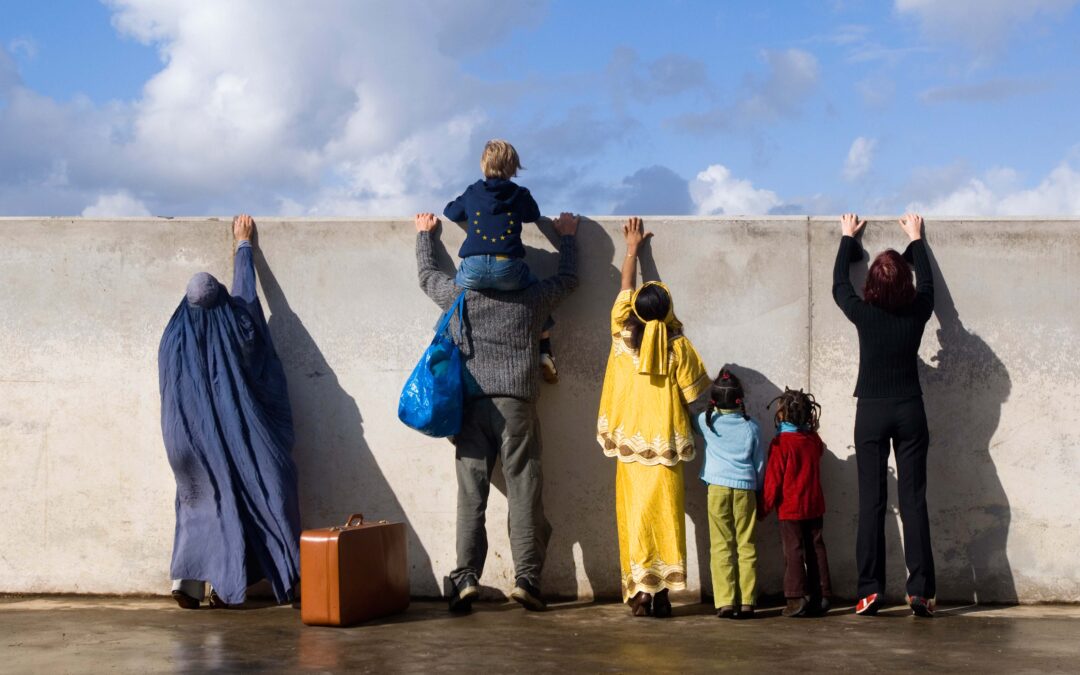
Aug 28, 2020 | Agendas, Events
Today, the ICJ and LPRC began a series of online seminars on international human rights mechanisms for the protection of migrants, refugees and asylum seekers for 44 Kazakh defense lawyers and human rights defenders of NGOs.
The seminars took plance via online communication on 28 and 29 of August and 12 of September. The event was of particular importance given the impact of COVID-19 on migration processes in Kazakhstan and Central Asia region.
The seminar lectures were delivered by prominent international experts in the field of migration from the International Commission of Jurists, representatives of the UNHCR Complaints Division, the European Council for Refugees and Exiles (ECRE) and the Greek National Human Rights Commission.
The participants discussed international principles and fundamental documents on expulsion, detention and protection, briefly overviewed the economic, social and cultural rights of migrants, and considered the hierarchy of legal acts in Kazakhstan, the relationship between international law and national legislation. The training program consisted of theoretical and practical components to strengthen the gained knowledge and develop practical skills for the protection of migrants at the international level. A training module was prepared for the participants with an overview of access to international human rights mechanisms.
This seminar complements previously conducted trainings for 105 defense lawyers and human rights defenders of non-profit organizations on strategic judicial protection of migrants and ensuring the exchange of best practices and strategies between Kazakhstani and European lawyers.
The seminar was organized by the Legal Policy Research Center (LPRC) in cooperation with the International Commission of Jurists (ICJ) and the International Commission of Jurists – European Institutions (ICJ-EI), with financial support from the European Union under the project “Strengthening Legal Protection of Migrants’ Rights in Kazakhstan”. The project aims to improve the access of migrants to national and international instruments for the protection of human rights in Kazakhstan, as well as to stimulate professional training and cooperation between specialized lawyers from Kazakhstan and their European counterparts.
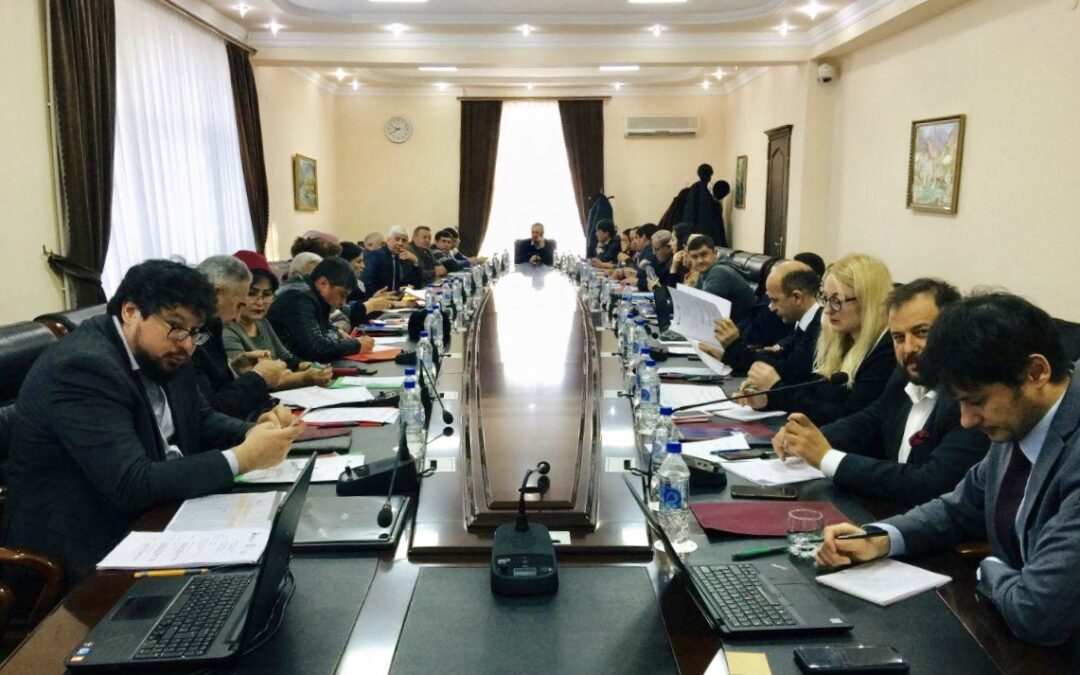
Aug 10, 2020 | News
Today, the ICJ published the recommendations from a workshop on strengthening the work of the specialized bodies of the Bar Association on the protection of the rights of lawyers in Tajikistan, held in December 2019.
The event was held on 16 and 17 December 2019 in the city of Gulistan in the North of Tajikistan for members of the Commission for the Protection of the Rights of Lawyers (CPRL) of the Union of Lawyers of the Republic of Tajikistan.The ICJ organized this seminar in cooperation with the Union of Lawyers of Tajikistan and the Legal Policy Research Centre, Kazakhstan.
The President of the Tajikistan Union of Lawyers, heads of regional departments of the Union of Lawyers, who are members of the Commission on the protection of the rights of lawyers, and other lawyers took part in the two-day discussion.
Based on the outcome of this discussion, the participants elaborated the recommendations to strengthen the work of the Commission. Those recommendations are provided below.
The recommendations have been formulated on the basis of the views expressed by members of the Tajikistan Union of Lawyers addressing the situation in Tajikistan, and are not intended necessarily to reflect the legal or policy positions or other views of the ICJ or to be applicable to other contexts.
This set of recommendations deals with key challenges faced by the CPRL in upholding the independence, security and effective work of lawyers in Tajikistan. However, the list of these issues is not exhaustive nor comprehensive and should be further reviewed in light of ongoing developments in the legal profession and the justice system as a whole.
The recommendations should be read in light of the international law obligations of Tajikistan to protect the right of access to a lawyer, to a fair trial and to effective remedies for violations of human rights, including under the International Covenant on Civil and Political Rights, and international standards on the role of lawyers, including the UN Basic Principles on the Role of Lawyers.
Recommendations in English (PDF)
Recommendations in Russian (PDF)

Jul 28, 2020 | Advocacy, Cases, Legal submissions, News
The ICJ intervened today in the case of the potential surveillance by Polish secret services of Mikołaj Pietrzak, lawyer and chair of the Warsaw Bar Association, Dominika Bychawska-Siniarska et Barbara Grabowska-Moroz of the Helsinki Foundation of Human Rights, and Wojciech Klicki and Katarzyna Szymielewicz of the foundation Panoptykon.
The five applicants applied to the European Court of Human Rights claiming a violation of their rights to privacy and to an effective remedy because the system of secret surveillance and collection of metadata created by the Law amending the Law of the Police of 15 January 2016 and the Anti-Terrorism Law of 16 June 2016 does not provide sufficient guarantees for this rights’ protection.
In its third party intervention, the ICJ addressed (1) the application of the principles of prescription by law, necessity and proportionality, in circumstances when mass and targeted surveillance interferes with the right to respect for private life under Article 8 ECHR, in particular when it affects lawyers and human rights defenders; (2) the obligations of States under Article 8 and 6 ECHR to ensure respect for the confidentiality of lawyer-client relations and the principle of legal professional privilege.
The ICJ argued that secret surveillance, in particular where it interferes with the confidentiality of communications of lawyers and human rights defenders, and endangers lawyer-client privilege protected under Articles 8 and 6 ECHR, should be subject to specific safeguards and to particularly strict scrutiny of its necessity and proportionality.
The third party intervention can be found here: PIetrzak&HF_v_Poland-AmicusCuriae-ECtHR-Cases-2020-ENG










